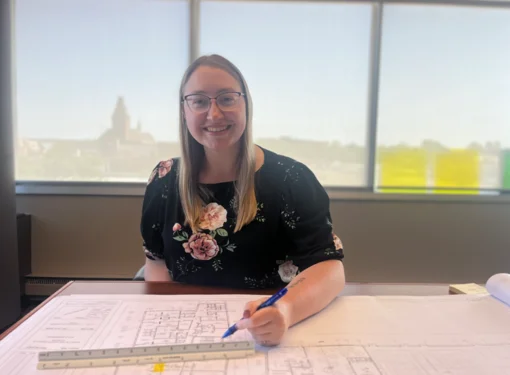Ambassador Spotlight: Sharon Brant
Sharon Brant surprises people. Sometimes it’s because of who she is. Having lost her vision by age nine, in the mid-1970s, she went on to finish school, marry, and have two sons. She commutes every day to her full-time job in Toronto and volunteers regularly, speaking to youth as a Rick Hansen Ambassador about living with a disability. Other times, it’s because of misconceptions.
“People usually ask if I know a blind person that they know, as if all blind people have met each other,” says Sharon. “I once overheard someone on the bus say, ‘She must be going to the Blind Institute to learn how to knit and crochet.’ I don’t know how to do either of those things. Some people think if you lose one sense, you automatically become stronger in another. You have to learn to use those other senses.”
To change attitudes about the potential of people with disabilities, Sharon believes education is essential. “I want everyone to know that people with disabilities are able and capable to work and have a normal life, even though we may need to do things a little differently,” she says.
Speaking up on education
Sharon’s vision was compromised at birth due to her exposure to the Rubella measles virus. She could see, though not perfectly, as a young child. Her vision gradually deteriorated, despite several surgeries, until she was fully blind.
Growing up with low vision in British Guyana was difficult. To learn braille, she would need to travel to a neighbouring country. She couldn’t continue at school because she couldn’t read books or the blackboard. People were more negative than curious when they asked, “What’s wrong with your eyes?” Her family emigrated to Toronto in 1979.
Sharon believes the more people are educated about living with a disability, the less they have to fear. “It’s important to do outreach in schools so kids will go home and educate their families,” she says. “Canada has a variety of cultures who are not exposed to people with disabilities. In Toronto, we have taxi drivers who refuse to pick up people with service dogs because of an ingrained belief that dogs are dirty. It’s imperative to speak to different community groups to raise awareness and educate.”
For Sharon’s sons, aged 25 and 8, having a mother who can’t see is a regular part of their life. “My younger son runs around the house with his eyes closed and says he’s like mommy,” she says.
Addressing accessibility and employment barriers
In the early 1980s, Sharon was involved with the Glenvale Players, a non-profit theatre group of blind, vision impaired, and sighted members, as well as people with other disabilities. This background helps with her public speaking and her job at the Information and Privacy Commission of Ontario, where she began working in 1988.
“I was hired to photocopy - even though I couldn’t see what I was photocopying - make coffee, and run errands,” says Sharon. “I learned to go with the flow. Now I’m permanently at reception working with the public.”
Her job is aided by ever-improving technology. The JAWS (Job Access with Speech) screen reader translates whatever is on her computer screen into speech. Because of the Accessibility for Ontarians with Disabilities Act (AODA), she feels more people are paying attention to workplace accessibility, citing a conscious effort during recent renovations at her office to widen doorways to new measurement standards.
One barrier Sharon would like to see more strongly addressed is the lack of employment and job advancement opportunities for people with disabilities, noting “it’s frustrating not to be able to move ahead or be considered for certain jobs.”
Finding solutions to accessibility challenges
Overall, Sharon feels the world is growing more accepting of people with disabilities. “When I first started commuting, I counted the stops or relied on the bus driver. Now a feature calls out the stops,” she says. “There are more raised buttons on elevators instead of flat-surface ones. A lot of buildings with revolving doors have a button you can press to open an ordinary side door. Revolving doors are difficult for anyone with a mobility or sight disability, and even for service dogs – you don’t want to catch their tails or paws.”
While touch screens remain a challenge on some household appliances, Sharon has a suggestion for navigating programmable gym equipment. “Someone in a University of Toronto physical education class once teamed up with me,” she says. “She got volunteer hours for her time and I had a buddy system. It worked well. It’s just different.”
***
If you're in Toronto, you can book a presentation by Sharon at your school or community space! Find more information at rickhansen.com/ambassadors.





